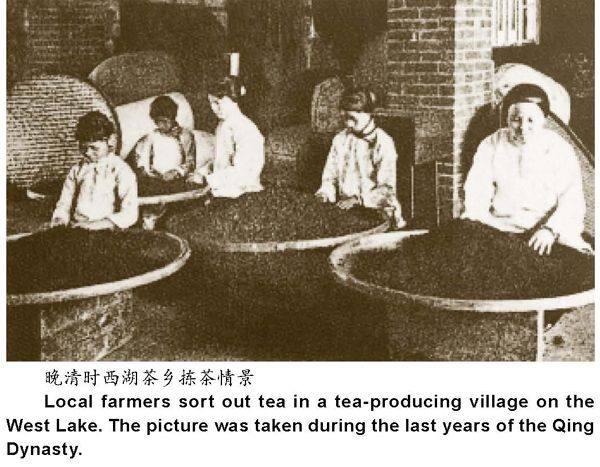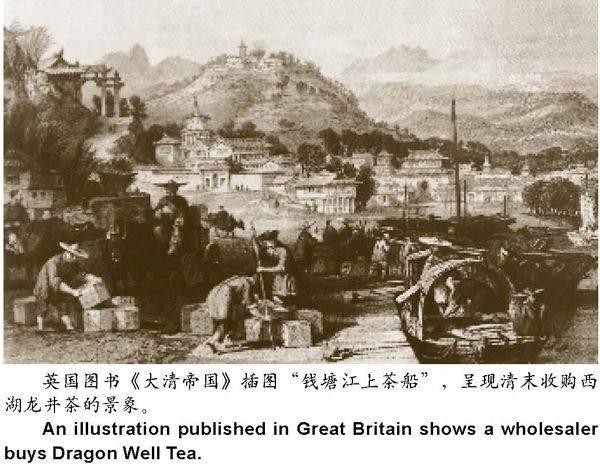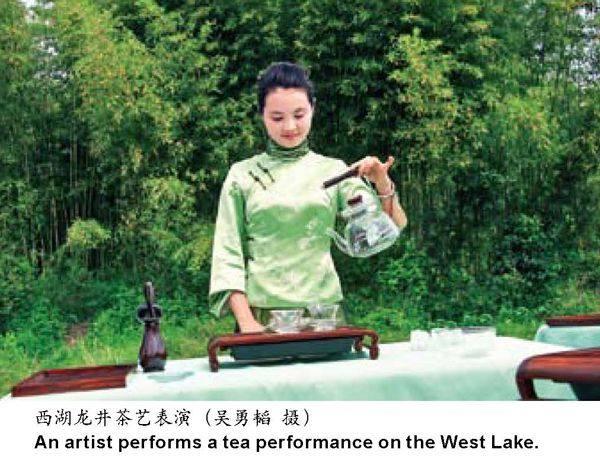法勒与龙井茶及其他
2013-04-29鲍志成
鲍志成



在20世纪70年代初打开中美关系大门的过程中,杭州龙井茶扮演了“国礼”角色,发挥独特作用。1971年7月9日,基辛格访华,周恩来与他在北京钓鱼台国宾馆举行首次会谈。基辛格对翠芽漂荡、香气升腾的极品龙井茶表现出极大的兴趣。会谈结束后,周恩来嘱咐工作人员送一些龙井茶到基辛格的房间。基辛格启程回国前,周恩来到钓鱼台国宾馆为他送行,并特意赠送1公斤特级龙井茶,基辛格非常感谢。在飞机上,基辛格拿出龙井茶仔细观赏,同行的随从纷纷围上来,分享去一半。回到华盛顿,基辛格第一时间去白宫向尼克松总统汇报中国之行的情况,把剩下的半包龙井茶作为最珍贵的礼物送给了尼克松。同年10月22日,基辛格再次来华访问,他见到周恩来时,开口就把机上分茶的事说了,表示希望能再次得到龙井茶。周恩来欣然满足了基辛格的要求,馈赠他4公斤龙井茶。有鉴于上次的教训,基辛格这次派外交信使用特级机密邮件将茶送回美国。次年2月,尼克松访华,在中南海会晤时、在钓鱼台谈判时、在杭州西湖国宾馆的八角亭谈判《中美联合公报》(即《上海公报》)时,周恩来都用龙井茶招待美国客人。2月25日,周恩来陪同尼克松一行到楼外楼品尝龙井虾仁等特色菜肴。离杭时,周恩来也把龙井茶作为国礼送给尼克松。一些美方随行人员还特意到当时杭州最大的解放路百货商店去购买了听装的特级西湖龙井茶。
然而,殊不知早在120年前,西湖龙井茶就在美国试种并初获成功。中国茶叶最初是在300多年前从荷兰再传到美国波士顿的武夷茶。1773年12月16日,波士顿爆发茶叶事件,揭开了独立战争的序幕,3年后美国建国。1800年前后,法国植物学家安德尔·米歇尔开始在美国试种茶叶,成为美国种茶第一人。1853年后,美国专利局及后来的农业部开始从中国引种茶叶。1859年,美国政府派遣园艺家罗伯特·福通来中国茶区考察,学习生产技术,收集茶籽,分种美国南方各州。1880年,美国农业部派约翰·捷克松兄弟在南卡罗来纳州试种茶叶,建立国家茶叶试验场,引种中国、日本、印度茶树成功,并首次生产茶叶制成品,开始出售。这些试种生产的茶叶中,就有美国驻宁波领事约翰·法勒引种的西湖龙井茶。美国试种茶叶前后近一个世纪,但在1915年后又告中断,一直未获成功,地理气候因素或许是导致美国屡次引种茶叶失败的主要原因。
约翰·法勒(1858-1923),美国马萨诸塞州人。他在华担任领事期间,积极从事经济、政治和社会活动。在宁波领事任上,法勒曾觅得西湖龙井茶籽传入美国。这件事在他的外交档案里并无记载,而是光绪三十二年(1906)《东方杂志》第三卷第十一号刊登的《美国茶业情形》一文中提及的:“一千八百九十二年,驻宁波美领事曾觅得杭州龙井茶子回国,于各省试种,惟南卡路来那著有成效。据农部言,近年以官地五十英亩试办,岁收茶叶一万磅,每磅工值贵至二十七仙半,而工人仍不趋于采制之业,未易招佣云。”这篇《美国茶业情形》没具作者,刊载在该期的“商务”栏目。文章介绍了美国各地民众饮茶偏好和华茶进口行销情况,并就近年日本、印度、锡兰等国茶“挤占”华茶市场份额现象及其原因作了分析。1892年即清光绪十八年,迄今整整两甲子了。法勒当年是如何觅得西湖龙井茶籽的,详情不得而知,但他之所以这么做,肯定是出于对西湖龙井茶的喜爱和经济价值的考量。而文章所介绍的龙井茶籽在美国“于各省试种”看,当年他采集的茶籽为数绝非少量,至于“惟南卡路来那(今译南卡罗来纳州)著有成效”,恐怕是与龙井茶种植的自然环境如纬度、气温、光照、土壤有关,还与人工栽培技术有关。从1892年法勒传入试种,到20世纪初美国政府农业部用50英亩国有土地试办茶场,前后不过10来年时间,而试办国家茶场后,每年的龙井茶茶叶产量就达1万磅,其规模也属可观。
法勒离任宁波领事后,继续在华外交生涯。清末民初中国社会从封建帝制走向共和政制的历史性巨变过程,法勒参与了一些历史事变。辛亥革命爆发,他曾介入国民革命军的军政活动。描绘辛亥革命后军阀群起的历史小说《辛亥大军阀》在第一卷第一百八十三章《杭州晚宴》中说:国民军将领陈敬云第一次来杭州时,和一群国民军高级将领从福州乘坐美国巡洋舰“安吉丽娜”号到达码头,当时随行而至的美国驻福州领事法勒为了避嫌并没有一同下船,而是稍候了一会。小说记叙说:“现在的法勒基本上已经变成了美国和陈敬云联系的传声筒,基于陈敬云的重要性和法勒在福州的出色工作,据闻美国方面已经有意让他担任下一任的美国驻华公使。”这足见,法勒在华任领事期间十分活跃。
随着法勒对中国国情了解的加深,他站在西方或美国利益的立场上,也对中国社会和中国人提出了一些鞭辟入里的看法。美国学者阿瑟·贾德森·布朗在其所著《辛亥革命》一书中,在谈到中国人的信仰时,引用了法勒的观点。布朗写道:“我十分赞同美国驻烟台领事约翰·法勒先生的观点。他说,一个诚心膜拜神像的中国人比一个什么都不相信的白人更容易相处,也更容易使之皈依,因为诚心拜佛的中国人至少对自己相信的事物倍加珍惜,后者虽然见多识广,但是对任何信仰全都毫不理会。世界上最没有希望的人就是明知真理却拒绝在自己的生活中贯彻真理的人。几乎所有的中国人都是有膜拜对象的,不是孔圣人,就是佛祖。”100多年前的一个外国人对中国人的理解,即便在今天也仍然有一定的参照价值和警示意义,值得我们深思。
(除署名外,本文图片由作者提供)
American Consul in Ningbo and Dragon Well Tea in America
By Bao Zhicheng
In 1971, Dragon Well Tea of Hangzhou served as state gift presented twice to Dr. Kissinger, then national security adviser. He expressed great interest in the Dragon Well Tea of Hangzhou at the first meeting with Premier Zhou Enlai held on July 9, 1971 at Diaoyutai State Guesthouse. Later, Zhou Enlai came to the guesthouse to see him off and presented him with a kilo of Dragon Well Tea before the adviser returned to America. While on the jet plane back to the United States, his colleagues shared some of the gift tea. The adviser later presented the remaining tea as gift to President Nixon. During his next visit to China in October, Kissinger told Premier Zhou about the tea and asked if he could get some more of Dragon Well Tea. Premier Zhou gave him four kilograms of the famous tea made in Hangzhou. This time, Kissinger took no chance. He sent it directly back to the states by diplomatic mail service.
During negotiations in Beijing and Hangzhou, Premier Zhou entertained American guests with Dragon Well Tea.
When President Nixon came to have dinner at Louwailou Restaurant on the West Lake on February 25, 1972 during his visit to Hangzhou, one of the dishes was Shrimp Stir-fried with Dragon Well Tea, a representative dish of the Hangzhou cuisine. Zhou presented Dragon Well Tea as state gift to Nixon before Nixon left Hangzhou.
The early 1970s was not the first time that Dragon Well Tea was introduced to Americans. Dragon Well Tea of the West Lake was introduced to America by John Fowler (1858-1923) during his 1890-1896 six-year-tenure as American Consul in Ningbo, one of the Chinese port cities open to international trade after the Opium War (1840-1842).
The introduction was not mentioned in his diplomatic reports. An American magazine published in 1906 mentioned that the American Consul in Ningbo got tea seeds of Dragon Well Tea of Hangzhou in 1892 and dispatched the seeds back home for experimental cultivation in various states in the United States. According to the report, the experiment was successful only in South Carolina. The magazine article reported that the Department of Agriculture allotted a plot of 50 acres for the tea cultivating experiment in South Carolina. The annual harvest amounted to 10,000 pounds in the early 20th century. As the average cost amounted to 27.5 cents a pound, it was not easy to attract business people and hire tea farmers and the commercial undertaking failed dismally. Judging from the report that the Dragon Well Tea was tried out in various states, the seeds from Hangzhou must have been in a large quantity.
The article did not carry the name of the author. It was published in the column under the title of business. The article presented an analysis of American consumers preference for various tea brands and sales of imported Chinese tea. The article also looked into the market competition from imported tea of Japan, India and Ceylon and came up with an analysis.
The report of the American magazine established the fact that more than 120 years ago Fowler acquired tea seeds from Dragon Well of West Lake in Hangzhou. Although no information reveals how he came into possession of the seeds, it would not be very difficult to guess that largely there were two ways: either he visited Dragon Well in Hangzhou to get tea seeds or he commissioned someone else to get the seeds on his behalf. Anyway, he must have got to know the value and reputation of Dragon Well Tea of Hangzhou before he managed to get the seeds and ship them back to the United States. Production in South Carolina must have boomed because the annual output of 10,000 pounds must have come from a much bigger expansion from the initial 50 acres.
John Fowler worked as a U.S. diplomat in China for many years. On and off in a period of more than 20 years, he was U.S. consul in Ningbo, Foochow (the present-day Fuzhou, capital city of Fujian Province), Chefoo (todays Yantai, a port city in Shandong Province).
